We may not have the course you’re looking for. If you enquire or give us a call on 01344203999 and speak to our training experts, we may still be able to help with your training requirements.
We ensure quality, budget-alignment, and timely delivery by our expert instructors.
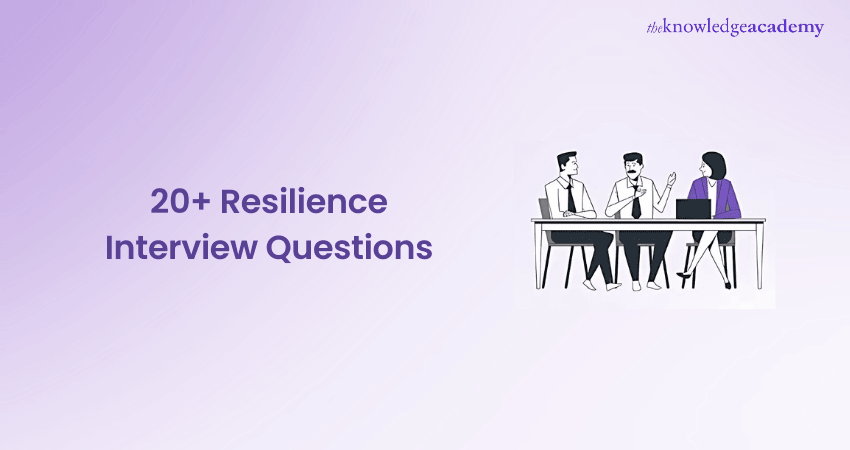
Resilience is one of the key traits that separates good professionals from great ones. The strength to bounce back, adapt, and conquer whatever comes your way is a mindset that employers can’t resist in today's increasingly competitive world.
The best way for employers to gauge it is through Resilience Interview Questions. This blog assembles more than 20 of the best Resilience Interview Questions and Answers that'll help you showcase your winning edge. So read on and impress with your stories of adaptability, grit, and the ability to thrive under pressure!
Table of Contents
1) Resilience Interview Questions
a) What does Resilience mean to you?
b) Share an experience where you faced failure. How did you navigate and overcome that challenging situation?
c) In your view, how can one measure resilience?
d) What are some factors that, in your opinion, contribute to building resilience?
e) Explain the distinction between risk factors and protective factors in the context of resilience
f) How do you draw a line between resilience and coping skills?
g) Do you believe there's a genetic aspect to resilience, and if so, how does it manifest?
h) Share an example illustrating how resilience played a pivotal role in someone overcoming adversity
i) How can organisations foster resilience among their employees?
j) Identify factors that can potentially limit an individual's resilience
k) Discuss the significance of resilience in leadership roles
l) From your perspective, how does self-care relate to building resilience?
2) Conclusion
20+ Resilience Interview Questions
The following Resilience Interview Questions will help your prospective employers gauge your strategies for overcoming stress, adversity, and challenges.
The sample answers will help you demonstrate your worth as a candidate dedicated to both personal and professional growth.
1) What does resilience mean to you?
Employers pose this question to test your knowledge of resilience and its significance. Your answer may be framed along the following lines:
“Resilience refers to the ability of an individual or a system to withstand, recover from, or adapt to challenges, setbacks, or difficult situations. It involves the capacity to bounce back from adversity, maintain mental and emotional well-being in the face of stress, and effectively cope with life's challenges. Resilience, for me, is a dynamic force that shapes character, instils hope, and empowers one to navigate life's complexities with grace.”
2) Share an experience where you faced failure. How did you navigate and overcome that challenging situation?
Employers seek candidates with the mental fortitude to bounce back from tough situations. While answering this, you must demonstrate your ability to handle failure and return stronger. Incorporating experiences from your professional and student life will make your answer credible and relatable. A sample answer may be something like this:
“Encountering failure was a pivotal juncture that changed the meaning of resilience for me. Professionally, a project I spearheaded fell short of expectations, and the weight of disappointment felt crushing. Navigating this setback involved a dual process of introspection and strategic action. Firstly, I embraced the discomfort, acknowledging my emotions while reframing failure as a stepping-stone to growth. Secondly, I meticulously assessed the project's shortcomings, learning profound lessons. Collaborating with the team, we recalibrated our approach, leveraging the setback as a catalyst for innovation. The experience reshaped my perspective, emphasising that resilience isn't just about overcoming challenges but leveraging them to evolve.”
Keen on making your business stronger and adaptable, refer to our blog on Business Intelligence.
3) In your view, how can one measure resilience?
Answer this question on a personal level and give your perspective on measuring resilience in a person. You can include the following to frame your answer:
a) Evaluating perceived resilience through questions on coping strategies, problem-solving, and social support.
b) Examining behavioural indicators like how individuals handle challenges and interact with others.
c) Gaining in-depth insights into personal experiences and perspectives on resilience.
d) Considering attendance records, academic performance, or workplace outcomes as indirect indicators.
e) Accounting for cultural nuances and contextual factors to ensure a nuanced assessment aligned with the diverse nature of resilience.
4) What are some factors that, in your opinion, contribute to Building Resilience?
Employers want to understand how you build or have built your resilience over time. Give them a peek into your processes and techniques to do the same. Your answer may include the following:
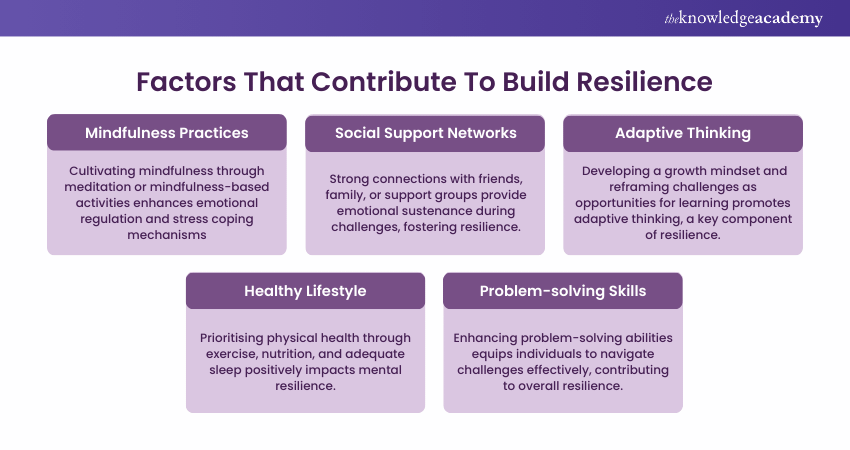
“In my perspective, several factors converge to cultivate resilience. Firstly, a robust support system comprising family, friends, and mentors forms a bedrock. These connections' encouragement and shared wisdom provide invaluable strength during challenging times.
Personal beliefs and a positive outlook are pivotal; maintaining optimism, even amid adversity, fosters resilience. Additionally, adaptability and the ability to embrace change emerge as crucial elements.
Each setback becomes a stepping stone when met with a flexible mindset. Learning from experiences, rather than dwelling on failures, contributes significantly. Self-care practices, both physical and mental, fortify resilience, ensuring one can endure and rebound from stress.
Lastly, a sense of purpose and a clear set of values provide direction, grounding individuals and guiding them through life's tumultuous currents. Together, these factors weave a tapestry of resilience, shaping an individual's capacity to face challenges with resilience and emerge stronger.”
Unlock your peak productivity with Attention Management Training - sharpen your focus and supercharge your success!
5) Explain the distinction between risk factors and protective factors in the context of resilience.
This behavioural question assesses your grasp of resilience and provides an opportunity to demonstrate its practical application in your life. It invites you to showcase your understanding of resilience concepts and how they influence your personal experiences and responses to challenges. A sample answer may be something like the following:
"In my understanding, the interplay between risk factors and protective factors is crucial in shaping resilience. Risk factors are the challenges or circumstances that can potentially undermine one's well-being, posing threats to mental health or overall stability. These might include adverse life events, trauma, or chronic stressors.
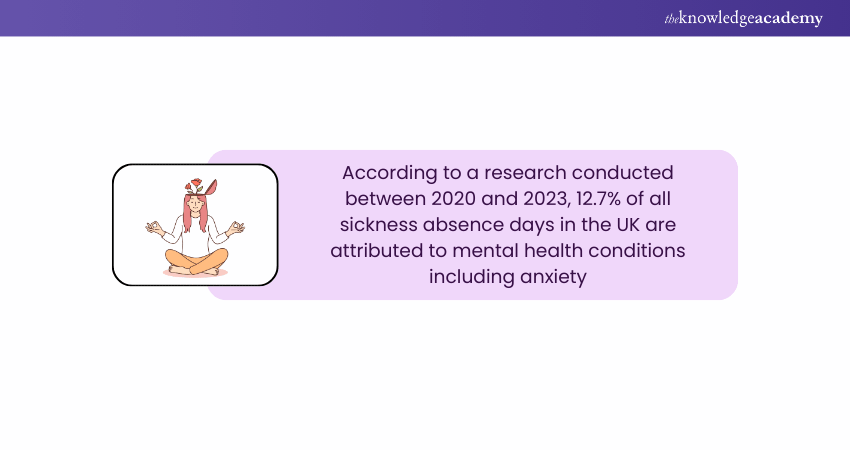
On the other hand, protective factors act as buffers against these challenges, enhancing an individual's ability to withstand and overcome adversity. These can be supportive relationships, coping skills, a sense of purpose, or a strong community.
Resilience, then, emerges from the delicate balance between exposure to risk and the presence of protective elements. It's not solely about avoiding challenges but navigating them with a robust support system and coping mechanisms."
6) How do you draw a line between Resilience and coping skills?
Explain how you apply resilience skills in your life and career, using examples to highlight the distinction between resilience and coping skills. Discuss the significance of these concepts in your professional endeavours. Your answer can be framed according to the template below:
“In my understanding, the distinction between resilience and coping skills lies in their essence and long-term impact. Coping skills are immediate strategies to manage stress or adversity, often providing short-term relief. They're reactive, addressing the symptoms of a challenge.
On the other hand, resilience is a broader, proactive capacity to endure difficulties and thrive despite them. It involves cultivating a robust mental and emotional foundation as a preventive measure, shaping one's outlook and response to challenges. While coping skills are the tools, resilience is the reservoir from which these tools are drawn.”
Unlock your organisation's future success with strategic planning and thinking – join our Strategic Planning and Thinking Training now.
7) Do you believe there's a genetic aspect to resilience, and if so, how does it manifest?
This question assesses your critical thinking abilities and problem-solving approach. It's crucial to demonstrate to the interviewer that you can use analytical reasoning and apply logical thinking to address challenges effectively. Your answer can be framed according to the template below:
"I believe resilience, to some extent, bears a genetic imprint, intertwining nature and nurture in shaping our response to challenges. While specific genes associated with resilience are complex and multifaceted, there’s a hereditary component influencing how individuals cope with stress and adversity. The interplay of genetic predispositions and environmental components moulds our stress response systems, affecting neurotransmitter regulation and neural pathways associated with resilience. This genetic aspect manifests in diverse ways, influencing emotional regulation, cognitive flexibility, and the ability to rebound from setbacks."
8) Share an example illustrating how Resilience played a pivotal role in someone overcoming adversity.
This question is an excellent opportunity to demonstrate your comprehension of resilience and its role in overcoming challenges. Share a personal or external example showcasing the transformative power of resilience. Highlight the capacity to navigate adversity and emphasise its importance in driving personal and professional growth. Your answer can be framed according to the template below:
"I once witnessed a colleague facing a significant setback in their career. Despite being overlooked for a promotion they had worked tirelessly for, they didn't succumb to despair. Instead, they channelled their disappointment into a renewed sense of determination. They tirelessly honed their skills, sought feedback, and embraced every learning opportunity available.
Their resilience was evident in their unwavering commitment to self-improvement and their refusal to let this setback define their future. Eventually, their perseverance paid off when an unforeseen opportunity arose. It taught me that resilience isn't just about bouncing back; it's about leveraging setbacks as catalysts for growth and ultimately emerging stronger and more capable than before."
9) How can organisations foster Resilience among their employees?
Employers might pose this question to gauge your resilience skills and your potential contribution to developing resilience in others within their organisation. So, share insights into your approach, detailing the steps you undertake when assisting individuals or groups in building resilience. Provide specific examples of successful strategies you've employed in the past, offering a comprehensive understanding of how you navigate and foster resilience. Your answer can be framed according to the steps below:
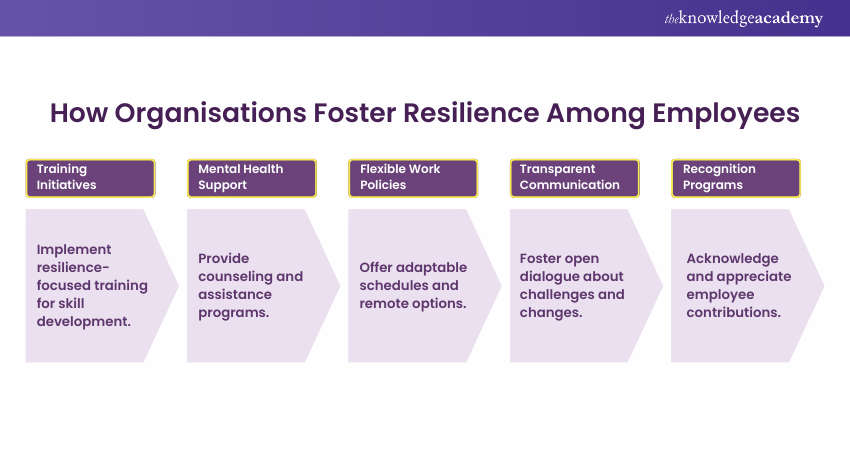
10) Identify factors that can potentially limit an individual's resilience.
Employers may pose this question to gauge your comprehension of resilience and its practical application across diverse scenarios. In responding, aim to pinpoint numerous elements that could impede resilience and elucidate their significance in devising strategies to surmount challenges. Your answer can be framed according to the following template:
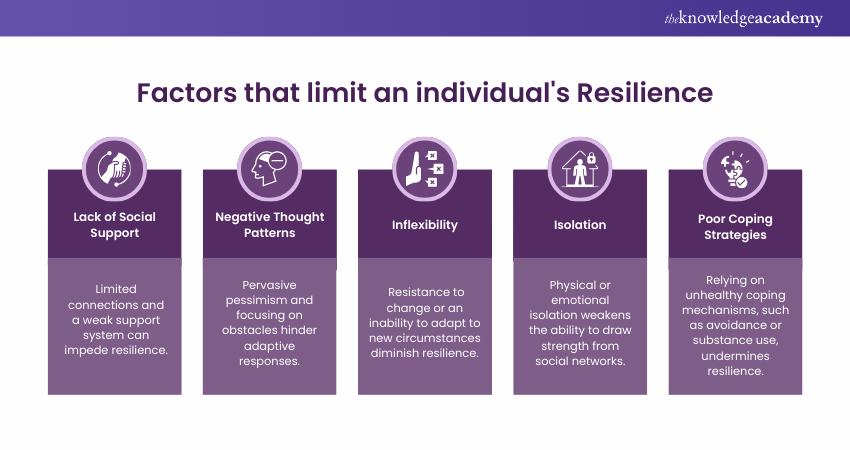
"In my understanding, several factors can constrain an individual's resilience. Firstly, a lack of supportive social connections can be a significant limitation. Additionally, a negative mindset or a fixed perspective can hinder resilience, making it challenging to adapt to and learn from adversity.
Personal insecurities and a fear of failure may also curtail resilience. External factors such as chronic stress, financial instability, or a toxic work environment can act as formidable barriers, eroding an individual's capacity to cope effectively."
11) Discuss the significance of resilience in leadership roles.
Demonstrate your grasp of the importance of resilience in leadership by sharing specific instances from your experience. Explain why resilience is crucial for leaders, detailing how it has personally contributed to your success and citing examples that highlight its impact on overcoming challenges and fostering team resilience. Your answer can be framed according to the following template:
"In leadership, resilience is the cornerstone of navigating challenges and uncertainties. In my opinion, setbacks, failures, and unforeseen obstacles are inevitable, but the ability to rebound and lead with unwavering determination defines true leadership.
Resilience can allow leaders to inspire and guide their team through turbulent times, fostering a culture of adaptability and perseverance. It transforms adversity into an opportunity for collective learning and growth, reinforcing the team's trust in my leadership.
Resilience isn't just a personal trait; it becomes a guiding force that shapes the entire team's response to challenges. This makes it an indispensable quality for effective leadership."
12) From your perspective, how does self-care relate to building Resilience?
Employers seek assurance that you understand self-care's significance and its role in enhancing resilience. Define self-care and elucidate its pivotal role in resilience. Illustrate with a specific instance where you applied self-care to navigate a challenge or stress. Your answer can be framed according to the following template:
From my perspective, self-care is the cornerstone of building resilience. Taking intentional and compassionate steps to nurture oneself becomes the foundation of resilience. Regular self-care practices, whether through mindfulness, adequate rest, or meaningful connections, act as fortifying agents, replenishing the inner resources needed to confront life's challenges. It's a conscious commitment to prioritise my needs, ensuring I have the strength and clarity to navigate adversity."
Unlock peace of mind and boost productivity with our Stress Management Training – join today to regain control over your life!
13) What is resilience in the context of Digital Marketing?
With this question, the employer seeks to evaluate the candidate’s understanding of resilience in adapting and responding to challenges in a constantly changing Digital Marketing landscape.
You can answer along the following lines: "Resilience in Digital Marketing refers to the capacity to adapt to algorithm changes, evolving consumer behaviours, and market trends while maintaining consistent performance. For example, when a platform like Google updates its search algorithm, Resilient Marketers quickly adjust their SEO strategies to ensure their campaigns continue to succeed."
14) How does resilience strategies benefit SEO and PPC Campaigns?
Through this question, the employer wants to assess how the candidate applies adaptability and proactive measures to maintain campaign performance.
You can answer along these lines: "Resilience strategies in SEO, like continuous monitoring of ranking factors, help maintain visibility despite algorithm changes. For PPC campaigns, resilience means adapting budgets, testing Ad variations, and leveraging data analytics to respond quickly to shifts in audience behaviour or competition."
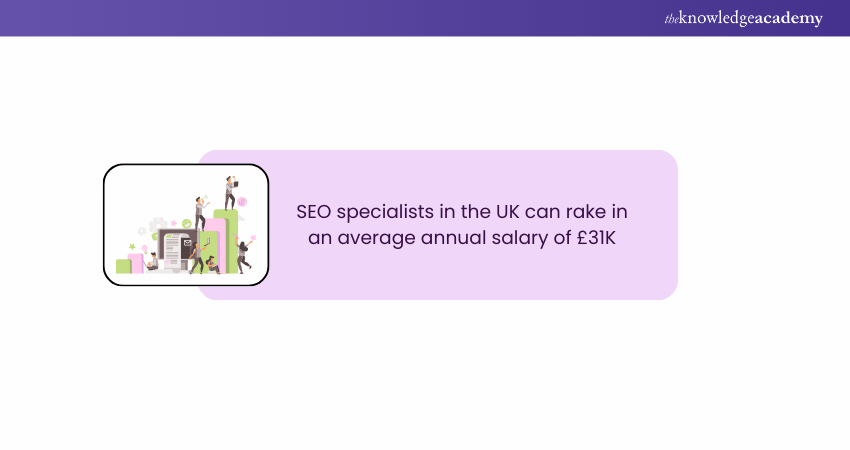
15) How resilience impacts Social Media Marketing?
The employer wants to explore how candidates manage setbacks on social platforms, such as algorithm changes or negative feedback.
You answer can align with this: "Resilience in Social Media Marketing ensures brands maintain engagement even during challenges like declining organic reach or backlash from a post. This involves creating diversified content strategies, responding to audience feedback thoughtfully, and adapting to trends like new platform features.”
16) What is resilience in the context of Marketing?
The employer seeks to gauge the candidate’s broader understanding of resilience in overcoming obstacles and adapting strategies in Marketing.
You can answer it the following way: "Resilience in Marketing is the ability to stay agile and overcome setbacks, such as economic downturns or shifts in consumer preferences. For instance, resilient brands pivoted to online campaigns and e-commerce models during the pandemic to remain competitive."
17) Importance of resilience in Market research?
With this question, the employer can examine how candidates use resilience to manage dynamic market conditions and extract actionable insights.
The answer can align with this: "Resilience in market research is crucial for adapting methodologies to collect accurate data during disruptions like consumer sentiment shifts. Researchers can quickly adjust surveys or focus groups to maintain relevant insights by leveraging digital tools and predictive analytics."
18) How resilience can impact Configuration Management?
The employer wants to test the candidate’s understanding of resilience in maintaining consistency and adaptability in configuration processes.
You can answer along these lines: "Resilience in Configuration Management ensures systems remain functional and adaptable amidst changes, like software updates or unexpected downtime. Implementing backup systems and automated testing helps organisations recover quickly and maintain operational integrity."
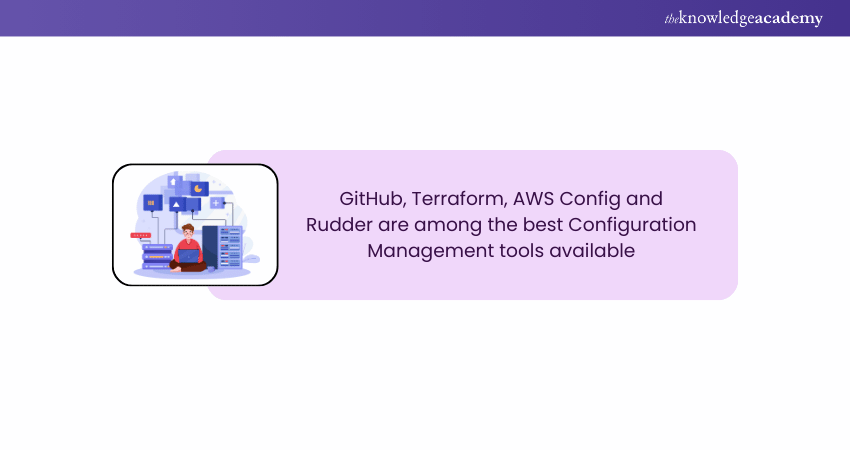
19) How does resilience impacts PPC campaigns?
With this question, the employer wants to evaluate the candidate's ability to sustain PPC performance despite competition or budget fluctuations.
You can answer it the following way: "Resilience in PPC campaigns means responding effectively to external factors, like rising keyword costs or ad platform changes. Advertisers can optimise Return on Investment (ROI) and maintain campaign success by regularly analysing performance metrics and testing new strategies."
20) How resilience helps in building Marketing strategies for small businesses?
This question explores how resilience enables small businesses to navigate limited resources and competitive markets.
This is the kind of answer the employer will expect: "Resilience helps small businesses adapt their marketing strategies to resource constraints and market shifts. For instance, focusing on cost-effective digital channels like Social Media and Email Marketing can deliver results even during challenging economic conditions."
21) What resilience one has to overcome while making money from YouTube and other Social Media platforms?
With this question, the employer seeks to gauge the candidate's understanding of the challenges faced by content creators and how resilience helps overcome them.
An ideal answer can be: "Making money from YouTube and Social Media requires resilience to handle algorithm changes, inconsistent audience growth, and content fatigue. Successful creators continuously innovate, analyse performance metrics, and adapt their content strategies to stay relevant and maintain income streams."
Conclusion
In mastering Resilience Interview Questions and answers, one unveils a profound capacity for growth and adaptability. These insights into personal fortitude transform interviews into platforms for showcasing resilience and the desire for growth. So, elevate your interview prowess by navigating the intricacies of interview questions related to resilience, turning challenges into opportunities for professional excellence.
Unlock your inner strength and resilience - join our transformative Resilience Training today!
Frequently Asked Questions
What are the Other Resources and Offers Provided by The Knowledge Academy?

The Knowledge Academy takes global learning to new heights, offering over 3,000 online courses across 490+ locations in 190+ countries. This expansive reach ensures accessibility and convenience for learners worldwide.
Alongside our diverse Online Course Catalogue, encompassing 19 major categories, we go the extra mile by providing a plethora of free educational Online Resources like News updates, Blogs, videos, webinars, and interview questions. Tailoring learning experiences further, professionals can maximise value with customisable Course Bundles of TKA.
Upcoming Business Skills Resources Batches & Dates
Date
 Resilience Training
Resilience Training
Fri 4th Apr 2025
Fri 27th Jun 2025
Fri 29th Aug 2025
Fri 24th Oct 2025
Fri 5th Dec 2025






 Top Rated Course
Top Rated Course



 If you wish to make any changes to your course, please
If you wish to make any changes to your course, please


